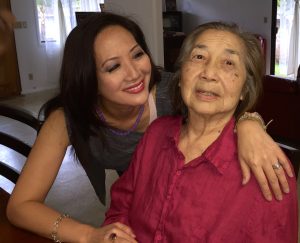AARP Hearing Center
Former television news anchor Diane Ako writes about her life as a mother, wife and caregiver to her mother, who is in the final stages of Alzheimer's, in her “Peace of Mind” blog

This was the first year Mother’s Day was hard for me, and this feeling takes me by surprise. When I go to see her, I’m usually chirpy and full of updates – which will never be understood but make me feel better to put out there.
This year, I had fully expected to do that when I went with the whole family. I’d like to think that somewhere in her mind, or maybe in a metaphysical way, she can feel our love.
We arrived at the care home, sat down on the sofa with her. She’s very loving and all she has done for a while now is repeatedly look at me and tell me, “I love you.”
She is a very sweet lady and we’re lucky this disease, which carves itself into a person’s psyche in unpredictable ways, has not changed her demeanor. Other people get paranoid and angry. She’s pleasant.
For some reason, when she told me she loved me, I looked into her eyes and held the gaze. I felt a connection.
Maybe it’s my imagination, but I felt she was actually present and comprehending that moment. We looked at each other. She said it again.
“I love you too, Mom,” I responded. We were still gazing. The connection expanded in my heart. It felt like a little bit of electricity or adrenaline. Interesting.
It doesn’t happen often for me. Does it for you? People don’t really talk about this. I don’t know.
As I think about it, I glimpse the faces of my friends, but social convention dictates that when you sit together, you don’t really stop to look into their eyes. Maybe I will start trying it, though I have to be careful my friends don’t think I’m romantic.
I was looking into her eyes and I started to cry, and I haven’t stopped. Because it was a gift to communicate with her again, even if for a few seconds. Because I miss her. Because I’m sorry she is deteriorating. Because she was sorry she is deteriorating, when she was still able to know it.
Then, I started to tell her all the things I’ve been thinking about for five years. My life was a blur since her diagnosis in 2012 and there hadn’t been a quiet moment, or the energy to hold these thoughts in my head, or even a plan to verbalize assorted feelings. But it felt right today.
“I miss you, Mom. I hate that you got sick. I’m sad we can’t talk anymore, or that you don’t know our lives today and your granddaughter. I’m sorry I don’t visit as much as I should. I went through a hard time, and I’m still getting over that. If you were well, I know you would have been there for me- and I really needed you. I was essentially abandoned by others I thought would be there for me, and that was hurtful,” I confessed, weeping.
I asked her if she felt comfortable, and she said yes. I reminded her that I loved her and appreciated her for being my mother.
I’m certain she was not mentally present for any of my speech. I just need to think that my words float in the ether and will make their way to her spirit.
The horrible thing about Alzheimer’s is that I keep falling into new stages of grief. I don’t know when it will come, but it’s happened enough now that the best way I can brace for it is to not be surprised when another cycle of sadness overtakes me. If there is an upside, it’s that I have every opportunity for closure because I’ve had years and years to think of what I need to say.
At this point, though, I think there is nothing more to say. It’s just my duty to be.































































